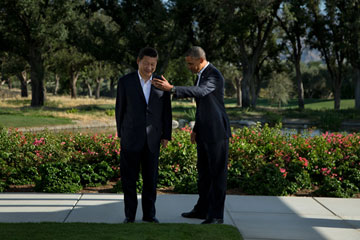
President Barack Obama, right, welcomes Chinese President Xi Jinping at the Annenberg Retreat at Sunnylands, Friday, June 7, 2013, in Rancho Mirage, Calif.
(5 of 5)
What came next was revealing. "Don't you see the difference?" Flournoy asked her Chinese hosts, who initially nodded in understanding. "I think for a couple of minutes, I had some cognitive dissonance going," she says with a chuckle. "Then they snapped back into, No, no, this must be disinformation--of course you're containing us."
Easier Said Than Done
Ultimately, what may reassure China more than any words or slides is skepticism about whether Obama's footing is sure enough to execute a pivot. Despite his ambition to step back from Middle Eastern entanglements, the region continues to serve as the geopolitical equivalent of a screaming newborn. Obama's foreign policy agenda has been consumed by the Arab Spring, Egypt, Syria, al-Qaeda and now Iran. His Sept. 24 address to the U.N. General Assembly was almost exclusively about the Middle East: in his more than 40-minute speech, Obama mentioned Syria, Egypt, Iran or Israel 68 times. China? Just once. His only other nod to Asia was a mention of North Korea's nuclear weapons.
"Even before the government shutdown, there was a lot of anxiety in Asia that, because of all the turmoil in the Middle East, the pivot was dying," says a former Senate foreign policy aide who visits the region regularly.
The pivot could also suffer from the departure of some of its key architects, including Donilon and Clinton. Donilon's replacement, Susan Rice, lacks his well-known passion for the pivot. Fixated on Syria and Arab-Israeli peace, John Kerry has traveled to the Middle East seven times as Secretary of State but to Asia just twice. Secretary of Defense Chuck Hagel has visited the region three times, although a late-August tour was dominated by a seemingly imminent military strike on Syria, forcing Hagel to join an emergency White House meeting via video conference from Kuala Lumpur.
Restoring the pivot's credibility will take many more visits by the likes of Kerry and Hagel. "It's important that we keep showing up," says Kurt Campbell, who recently served as the U.S. State Department's top Asia hand. In his Oct. 8 news conference, Obama offered an analogy to corporate CEOs--who, he said, "if they want to close a deal, aren't gonna do it by phone."
China's President certainly didn't. In Jakarta, Xi became the first foreign leader to address the parliament of Indonesia, the world's largest Muslim-majority nation, and announced a slew of trade deals worth more than $30 billion. In Malaysia, he spoke of better trade relations with that country and of strategic cooperation in the South China Sea.
Back home in Beijing, his government was warning the U.S. not to endanger the world economy with a debt default. At a time when America hopes to teach China about economic rules of the road, Beijing is lecturing Washington about its responsibilities. It was another embarrassing reminder for Obama that managing Asia will have to wait until he's managed his problems at home.
--With reporting by Hannah Beech/Beijing
